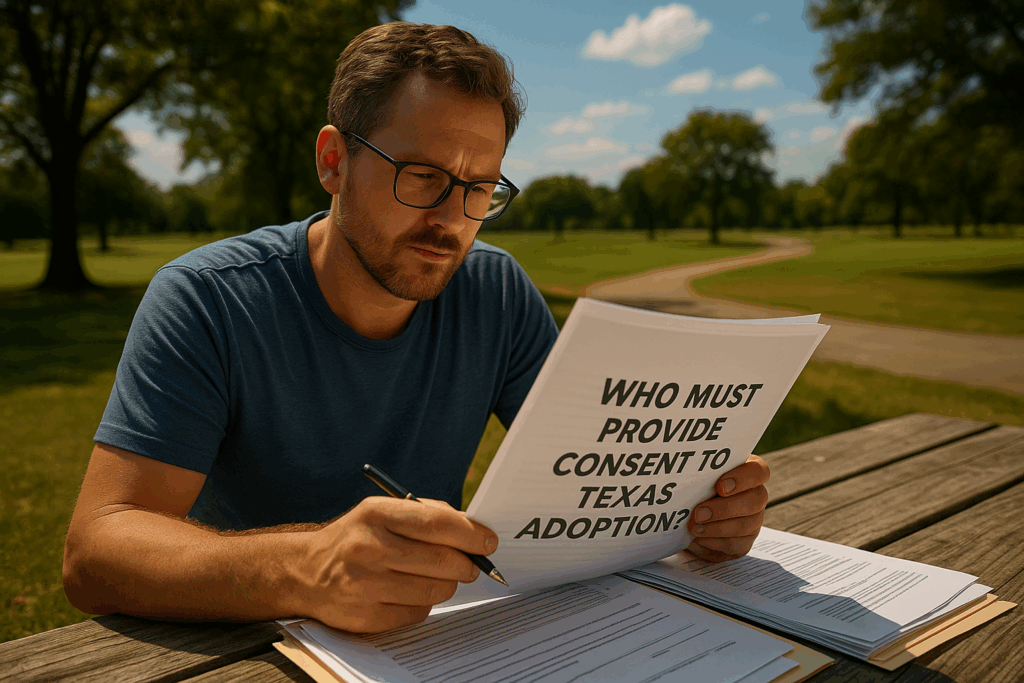Overview of Adoption Consent Laws in Texas
Understanding adoption consent laws in Texas is crucial for prospective parents and legal guardians. These laws dictate who must give consent for an adoption to be legally recognized, ensuring that the rights of birth parents, adoptive parents, and the child are respected throughout the process.
In Texas, consent is typically required from the birth parents unless their rights have been terminated. This includes both biological mothers and fathers, although certain exceptions may apply. For instance, if a parent is deemed unfit or has abandoned the child, consent may not be necessary. Familiarizing oneself with these laws can help potential adoptive parents navigate the complex legal landscape effectively.
Key Parties Involved in Adoption Consent
The adoption process in Texas involves several key parties who play a significant role in providing consent. Understanding who these parties are and their respective rights is essential for anyone considering adoption.
Primarily, the birth parents must consent to the adoption unless their parental rights have been legally terminated. Additionally, in cases involving stepparents or relatives, the consent of the other biological parent may also be required. Legal guardians, adoption agencies, and attorneys may also be involved in the process, ensuring that all legal requirements are met for a successful adoption.
Legal Procedures for Obtaining Consent in Texas
Obtaining legal consent for adoption in Texas involves specific procedures that must be followed to ensure compliance with state laws. These procedures are designed to protect the interests of all parties involved, particularly the child.
The process typically begins with the birth parents being informed of their rights and the implications of giving consent. A formal consent document must be signed, which may require a notary public to validate the signatures. It's also essential for adoptive parents to work with a qualified attorney to navigate any complexities that may arise during this process, ensuring that all legal standards are met.
Challenges and Considerations in Adoption Consent
While the adoption process can be rewarding, there are several challenges and considerations related to consent that prospective parents should be aware of. These challenges can vary based on individual circumstances and the dynamics of the families involved.
One common challenge is dealing with the emotional aspects of consent, particularly if the birth parents are struggling with their decision. Additionally, legal disputes may arise if a birth parent changes their mind after giving consent. Understanding these potential challenges can help adoptive parents prepare and seek appropriate legal guidance to ensure a smoother adoption experience.
Overview of Adoption Consent Laws in Texas
Understanding adoption consent laws in Texas is crucial for prospective parents and legal guardians. These laws dictate who must give consent for an adoption to be legally recognized, ensuring that the rights of birth parents, adoptive parents, and the child are respected throughout the process.
In Texas, consent is typically required from the birth parents unless their rights have been terminated. This includes both biological mothers and fathers, although certain exceptions may apply. For instance, if a parent is deemed unfit or has abandoned the child, consent may not be necessary. Familiarizing oneself with these laws can help potential adoptive parents navigate the complex legal landscape effectively.
Key Parties Involved in Adoption Consent
The adoption process in Texas involves several key parties who play a significant role in providing consent. Understanding who these parties are and their respective rights is essential for anyone considering adoption.
Primarily, the birth parents must consent to the adoption unless their parental rights have been legally terminated. Additionally, in cases involving stepparents or relatives, the consent of the other biological parent may also be required. Legal guardians, adoption agencies, and attorneys may also be involved in the process, ensuring that all legal requirements are met for a successful adoption.
Legal Procedures for Obtaining Consent in Texas
Obtaining legal consent for adoption in Texas involves specific procedures that must be followed to ensure compliance with state laws. These procedures are designed to protect the interests of all parties involved, particularly the child.
The process typically begins with the birth parents being informed of their rights and the implications of giving consent. A formal consent document must be signed, which may require a notary public to validate the signatures. It's also essential for adoptive parents to work with a qualified attorney to navigate any complexities that may arise during this process, ensuring that all legal standards are met.
Challenges and Considerations in Adoption Consent
While the adoption process can be rewarding, there are several challenges and considerations related to consent that prospective parents should be aware of. These challenges can vary based on individual circumstances and the dynamics of the families involved.
One common challenge is dealing with the emotional aspects of consent, particularly if the birth parents are struggling with their decision. Additionally, legal disputes may arise if a birth parent changes their mind after giving consent. Understanding these potential challenges can help adoptive parents prepare and seek appropriate legal guidance to ensure a smoother adoption experience.

